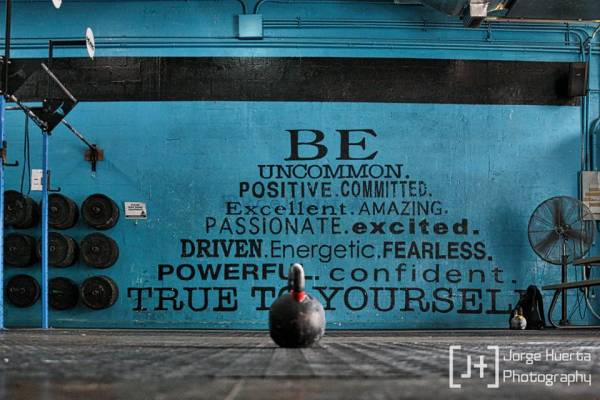On the continuum between couch potato and professional athlete there are many different options. It’s always great to see someone make the decision to get up from the couch and try to become healthier. But what often happens is that they become Born Again Exercisers.
Born Again Exercisers
The thing about Born Agains is that they become rabid, vocal, and opinionated, while missing the point of the whole thing. Exercise isn’t about anything other than you trying to be a better person than you were yesterday. While competition can be a great way to reflect improvements made in training, the reality is you’ll spend far more time training and out of the gym, than you will in competition, no mater how fervent you are.
There’s a real trend in fitness circles now to push everyone to train for something. You know, as if training to have a healthy life is somehow not a worthy goal. So we’re all busy training for a race, a competition, a tournament, a meet – something. But is it more important to have a bigger squat in six weeks or will it be more important to walk properly in twenty years?
As the world grows more obese and out of shape, the fitness industry needs to come to grips with where we should actually fit in. While there will always be a market for fringe things like weightlifting meets, endurance racing, and bootcamps that make people vomit, more and more the focus needs to be on reaching the masses and on making people healthier for life.
If you ever watch a professional athlete live his or her life a few things will become very obvious very quickly. The following are lessons we should all keep in mind to help us make our lives healthier:
1. Exercise Must Be an Everyday Occurrence
Pro athletes don’t train because they have to. They grew up wanting nothing more than to play their sport for the rest of their lives. But to do so they had to learn to fit it in around the rest of their lives first. There was school and homework. There were dates and maybe marriage and kids. There was work (before they signed a pro contract) and all the responsibilities that brought with it. And still they found the time.
The pro athletes I’ve met browbeat everyone who talks incessantly about how fantastic their training is going, how they crushed a WOD, or whatever their latest injury problem is. The reason is because that is part of a pro athlete’s work life. In the same way that if you asked a programmer what went on during their day, you’d likely get a short answer about how routine it was. Well, barring injury that’s how most days are for an athlete, too – wake up, eat, train, sleep, eat, train, eat, and then go to bed for the night (probably at about 9:00pm, too). If the athlete in question is an endurance athlete, then this is compounded, as there’s little chance he or she did anything thrilling on his or her solo six-hour ride.
Lesson: Making exercise part of everyday life means that even when bikini season is done or there is no competition on the horizon, a person will continue to stay in shape. This means you get in the habit of doing something every day. It doesn’t matter if you run, lift, or go for a walk – just be in the habit of daily exercise. It being another part of your day as much as brushing your teeth or going to work will ensure long-term health and fitness.

2. You Get the Results You Deserve
Rule one at my gym is “turn up.” It’s pretty difficult to make exercise a part of daily life if you don’t turn up. I know it’s difficult to get up early when it’s cold and dark, like it is now in Australia as we go through winter. But we have lights and you’ll warm up quickly, I promise.
The funny thing about turning up is that after a while what was once a struggle and so foreign becomes more habitual as the new activity starts to weave its way into your daily life. That’s exactly what we’re after.
But just physically turning up is no good. You have to be mentally present, too. No matter how much I might push you to try harder, only you can actually lift the weight or complete the effort. If you slack off, give up mentally just because you were uncomfortable, or otherwise underperform, then you won’t reap as much reward as the person who does push past that discomfort.
Lesson: The people who seem to push the hardest in a class are usually the ones who come the most. Just like it takes some time for getting up early to become part of who you are, it can take a while to become someone who will fight on despite discomfort. But to learn that skill you need to continually apply more pressure to yourself.
3. There Is as Much Mental Change Required as Physical
The modern world focuses on only two components relating to fitness. All you see are diet and exercise. But the mental aspect of training required to maintain a healthy and active lifestyle cannot be ignored.
When you go food shopping, you need willpower and discipline to not buy the all the junk food at the supermarket, just the same as you need discipline to get out of bed when it’s cold and dark. A good workout will offer you opportunities to develop a healthy mindset during each session. As mentioned above, if you take the opportunity to push a bit more each session, to learn to accept being uncomfortable, then some strange things happen.
First, that big pile of work you’ve been putting off forever won’t seem so intimidating right now. And that fear you have of wearing a two-piece swimsuit after two kids? Gone. The confidence, determination to succeed, discipline, and work ethic gained in the gym will absolutely become apparent in other areas of your life.
Lesson: Like wanting to get in better shape at the gym so you can run around with your kids outside the gym, the only way to develop any type of fitness is to work on it. If you want to develop greater mental strength inside the gym so you’ll have it outside the gym, then you need to work as diligently as you work on the physical side of things.

4. Whatever You Do in Training, You’ll Do in Games
When I used to race motorbikes, we would say that if you can’t do it slowly, you would never do it fast. The same goes for practices and gym time. If you can’t do it without the pressure of competition, how do you expect to be able to do it when crunch time comes? The thing to remember, though, is that crunch time in this case is daily life.
If you can’t get up to go to the gym, what chance do you have of resisting that doughnut offered during the meeting? You may think it’s two separate things, but it’s not. Both display a lack of discipline, and discipline is the cornerstone of good habits.
Lesson: I’m not saying you don’t get to sleep in ever again (or eat a doughnut), but if you want good results in the gym, then you need to work for them, and that rests on the amount of discipline you have.
A friend of mine, Rob McDonald of Gym Jones, said on Twitter recently, “The program is a learning tool and meant to inform. Remember the programming isn’t magic and it was hard work and dedication that mattered.” Professional athletes have long known that the only “secrets” to success are to bust your ass daily and do it for years. Apply yourself wholly to the task and watch the results come, but don’t dab your toe in and wonder why you’re not getting a great result.
Photos courtesy of Jorge Huerta Photography.






